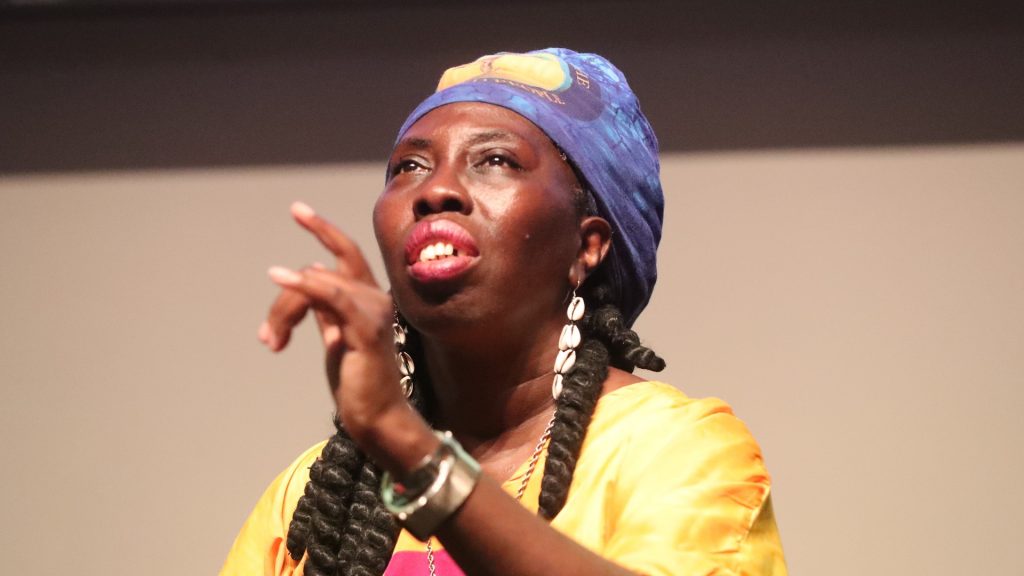Gullah/Geechee chieftess reflects on St. Helena shooting, community resilience

Just before 1 a.m. on Sunday, Oct. 12, the island of St. Helena off the coast of South Carolina was rocked when a gunman opened fire on a crowded restaurant, killing at least four people and injuring nearly two dozen more. While a mass shooting is devastating for any community, for the citizens of the island’s Gullah/Geechee Nation, the attack was particularly heart-wrenching.
A Gullah/Geechee celebration turns to mourning
The day before the shooting, the Gullah/Geechee Nation, led by Chieftess Queen Quet, celebrated the preservation of their land and culture, both of which are continuously under threat by property developers and the larger political system.
“What should have been a date that I will always remember as the day that we celebrated our recent victory protecting St. Helena Island’s Cultural Protection Overlay District is now overshadowed by community heartache and pain,” Queen Quet, whose full name is Queen Quet Marquetta L. Goodwine, told Straight Arrow News.
The day’s events had been marked by rain, but that didn’t stop St. Helena Island’s Gullah/Geechee Nation from coming together to celebrate. At the same time, however, Queen Quet said she knew something about the day wasn’t right.
“I was happy to see folks come out in spite of the rain and spend time together uplifting one another,” Queen Quet said. “However, the entire day, I had an ominous feeling and I was trying to shake it.”
As the weekend drew to a close, so too did the spiritual leader’s prescience come into stark relief.
“It wasn’t until Sunday evening that I found out that people had died, including a family member of mine,” Queen Quet told SAN. “I had hugged my ‘big little cousin’ just a couple of months before and we took a photo together. He was proud to introduce his girlfriend to me so that she knew we were really family. So, when we got the call that he was killed, I hoped that this was a rumor that was wrong, but it wasn’t a rumor.”
In an email shared with Straight Arrow News on Monday, the Beaufort County Sheriff’s Office identified the four individuals who were pronounced dead at the scene, including A’shan’tek Milledge and Kashawn Glaze, both 22, 54-year-old Amos Gary and 33-year-old Chiraad Smalls.
“The people whose blood was spilled joined with the blood of our Gullah/Geechee ancestors that is deep within this soil and still pulsates through the bodies and hearts of those who are their family members,” Queen Quet said. “Since they no longer speak, I appreciate having an opportunity to speak for them as my people elected me 25 years ago to do for all of us.”
The Nation’s loss was further compounded, as it came roughly one year after two tragedies –– Hurricane Helene in September 2024 and the collapse of a gangway one month later –– hit the Gullah/Geechee Nation on an island off Georgia’s coast.
“Not only had St. Helena lost one of our own, the entire Gullah/Geechee Famlee was mourning the loss of ‘we chillun’ almost a year after we mourned what happened at Sapelo Island, Georgia, which is also here in the Gullah/Geechee Nation,” Queen Quet said.
4 centuries of cultural resilience
The Gullah/Geechee Nation of St. Helena’s Island has around 10,000 citizens. Media coverage pins the number at 5,000; however, Queen Quet told SAN that the number is incorrect, as a previous census largely overlooked the island’s population.
The Gullah/Geechee’s ancestors were brought to the region in the 1600s, at the start of America’s chattel slave trade. As the centuries progressed and enslaved Africans were freed, Queen Quet’s family put down roots in Beaufort County, which sits along the coast of the Carolinas, or Chicora as it’s known to the area’s Indigenous and African communities.
“My family stems from St. Helena Island, Polowana and Dataw Islands here in a county that is referred to as ‘beautiful Beaufort by the sea,’” Queen Quet explained. “As I often tell people, it is not only beautiful because of our scenic landscapes, it is beautiful because it is adorned in Gullah/Geechee culture. Our culture is rooted in the Sea Islands, and we are the souls of this soil.”
Despite having nearly half a century in the region, the Gullah/Geechee Nation routinely finds itself under threat from property developers and the wider political system.
“The major unique challenge is that we still value GOD, land and one another over money and other things, and people want to displace us or melt us into the ‘great American melting pot,’” Queen Quet said. “Folks tend to only look at our Sea Islands as a place that can be financially exploited. They see dollar values for property. Folks are seeing dollar values through their news stories. However, Gullah/Geechee culture is priceless.”
The Queen Mother continued, “We’ve witnessed people trying to push us apart by trying to get us to accept money in exchange for our land, our legacy, our culture, our community and our love for one another. However, over the last three years, as a developer/’destructioneer’ sought to tear St. Helena Island apart, the natives that are culture keepers of this island stood united to hold onto our community and our way of life.”
Gullah/Geechees look to the future
Queen Quet advocates for the needs of the Gullah/Geechee Nation at the local and federal levels. She also serves as a representative at United Nations conferences –– something she said U.S. politicians will not do.
“We have faced challenges many times in regard to people not being willing to accept that we want our land, water, human rights, our people and our peace protected,” Queen Quet said. “Yet, we continue to stand up for those rights, our peace and for native Gullah/Geechees.”
As for the immediate future, Queen Quet said she will provide “community healing circles,” not least of which will take place in November during the Penn Center Heritage Day Celebrations, which honor the first school that opened for formerly enslaved peoples in the South.
“We will bring the entire Gullah/Geechee St. Helena Family together with supporters next month in the Penn Center National Landmark Historic District for the annual Penn Center Heritage Days Celebration,” Queen Quet said. “There, we will collectively pay our respects and embrace the families that lost their loved ones. That is how we get through any storm, whether it is a literal hurricane or a storm of attacks against our cultural community –– together in prayer and upliftment.”
Meanwhile, the Gullah/Geechees will also celebrate Gullah/Geechee Cultural Heritage Awareness Month, recognized every October.
“People need to learn the truth about who we are in the Gullah/Geechee Nation’s epicenter –– historic St. Helena Island, South Carolina. They need to know that we are a strong people that have survived many things, including people doing all that they could to destroy our unity, history, heritage, language and cultural traditions,” Queen Quet said. “However, GOD has made it such and us such, that they have not been able to accomplish those attempts!”
Queen Quet concluded with a rallying cry in the Gullah/Geechee dialect.
“We binya! We ain gwine nowhey! We will continue to stand up! We will continue to stand strong! We will continue to be the people of faith that GOD made us to be! WEBE Gullah/Geechee Anointed People! We don’t have to come together as St. Helena! We have to STAY together and STAY strong! We Famlee pun disya island een de sea! GAWD gwine keep we!”
The post Gullah/Geechee chieftess reflects on St. Helena shooting, community resilience appeared first on Straight Arrow News.





